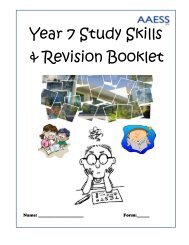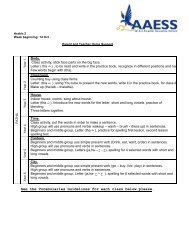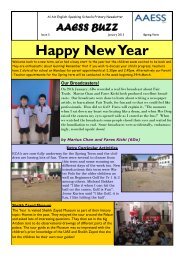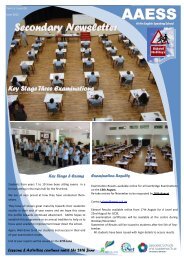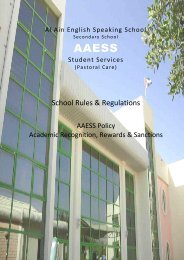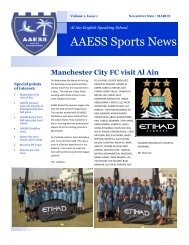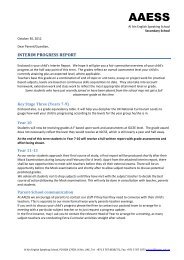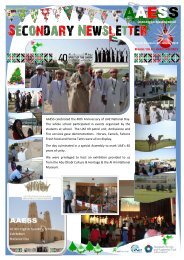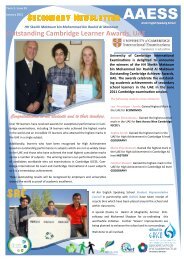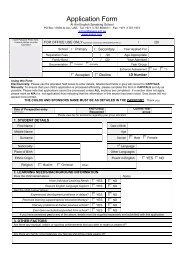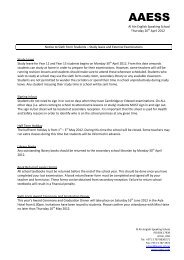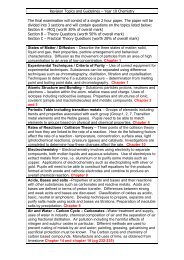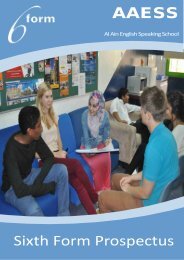AAESS IGCSE Options Booklet - Al Ain English Speaking School ...
AAESS IGCSE Options Booklet - Al Ain English Speaking School ...
AAESS IGCSE Options Booklet - Al Ain English Speaking School ...
You also want an ePaper? Increase the reach of your titles
YUMPU automatically turns print PDFs into web optimized ePapers that Google loves.
The History <strong>IGCSE</strong> syllabus looks at some of the major international issues of the nineteenth and twentieth<br />
centuries, as well as covering the history of particular regions in more depth. The emphasis is on both historical<br />
knowledge and on the skills required for historical research. Students learn about the nature of cause and<br />
effect, continuity and change, similarity and difference and find out how to use and understand historical evidence<br />
as part of their studies. <strong>IGCSE</strong> History will stimulate any student already interested in the past, providing<br />
a basis for further study, and also encouraging a lifelong interest in the subject. Both coursework and noncoursework<br />
options are available.<br />
Course Aims<br />
17<br />
History (0470)<br />
Cambridge International Examinations Board<br />
The aims of the syllabus are set out below and describe the educational purposes of a course in History for the<br />
<strong>IGCSE</strong> examination. They are not listed in order of priority.<br />
The aims are to:<br />
stimulate interest in and enthusiasm about the past;<br />
promote the acquisition of knowledge and understanding of human activity in the past;<br />
ensure that the candidates' knowledge is rooted in an understanding of the nature and use of historical evidence;<br />
promote an understanding of the nature of cause and consequence, continuity and change, similarity and difference;<br />
provide a sound basis for further study and the pursuit of personal interest;<br />
encourage international understanding;<br />
encourage the development of linguistic and communication skills.<br />
Course Components<br />
The History syllabus offers students the opportunity of studying<br />
some of the major<br />
International issues of the nineteenth and twentieth centuries, as<br />
well as looking in somewhat greater depth at the history of particular<br />
regions. However, the emphasis within the syllabus is as much<br />
on the development of historical skills as on the acquisition of<br />
knowledge.<br />
The syllabus will promote an understanding of the nature of cause<br />
and consequence, continuity and change, similarity and difference,<br />
based on an appreciation of the nature and use of historical evidence.<br />
Candidates will be expected to:<br />
recall, select, organise and deploy knowledge of the syllabus<br />
content;<br />
demonstrate an understanding of:<br />
(a) Change and continuity, cause and consequence, similarity<br />
and difference;<br />
(b) The motives, emotions, intentions and beliefs of people in<br />
the past;<br />
comprehend, interpret, evaluate and use a range of sources<br />
as evidence in their historical context.<br />
Levels of Entry<br />
Pupils are assessed within the full range of grades. (A - G)<br />
Assessment<br />
The assessment scheme consists of three<br />
exam papers:<br />
Paper 1 (40%) will consist of two sections<br />
covering core content and depth studies.<br />
Paper 2 (33%) will include a collection of<br />
source material relating to the prescribed<br />
topic, and a series of questions based on<br />
the material.<br />
Paper 3 (27%) will be source based questions<br />
on a depth study.<br />
Considerations for Entry on Course<br />
An <strong>IGCSE</strong> in History shows that you have a high level of literacy and that you are able to analyse complex information.<br />
Responsibilities of the Student<br />
The student will be required to learn content on a regular basis, write essays demonstrating their understanding<br />
of the topic and use their knowledge to interpret and make inferences from given sources.<br />
Created by Nasser Lone 2011



